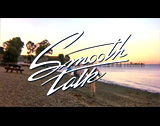
|
Smooth Talk (1985)
In writer/director Joyce Chopra's
brilliant but haunting and unsettling coming-of-age romance drama
- it won the Grand Jury Prize at the Sundance Film Festival (then
called the U.S. Film Festival) in 1986. Chopra's feature-directing
debut film was adapted by Tom Cole (Chopra's real-life husband) from
Joyce Carol Oates' 1966 allegorical short story "Where
Are You Going, Where Have You Been?" The short story about a
young girl sought after by a predatory murderer was inspired
(or based) upon the case of a true-crime killer named Charles Schmid
who committed horrific crimes against three young women in the mid-1960s
in the Tucson, AZ area. The notorious killer became known as the "Pied
Piper of Tucson."
The underrated sleeper film had only
a limited release to theatres during its initial run, and was difficult
to view on VHS or DVD for years. On a small budget of $1 million,
the joint
US/UK production failed at the box-office with only about $17,000
in revenues.
The story followed an innocently-flirtatious and restless
teenaged girl in the midst of adolescence who was bored with her
rural farm life during the summer - until she had an unsettling encounter
with a menacing but befriending older male aptly named Arnold Friend.
She was forced to examine her own approaching adulthood and overwhelming
sexual awakening, and the dangers inherent in interacting with a
sinister and seductive male who had been "watching" her.
- the main setting of the film was during a lazy summer
vacation period in the Petaluma area of Northern California at
the rural fixer-upper farmhouse (that needed renovation and painting)
of young teen girl Connie Wyatt (18 year-old
Laura Dern in her first lead role)
- the rebellious, often self-absorbed, semi-vain,
shallow, gawky and confused adolescent 15 year-old blonde girl
was on the treacherous verge of womanhood; she was continually
struggling with her mother in a drive for self-independence; the
self-conscious and awkward young female had just completed her
freshman year in HS - she was boy-crazy and craved male attention
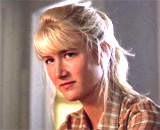
Connie Wyatt (Laura Dern) - 15
Year-Old Teen
|
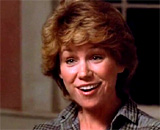
Katherine (Mary Kay Place) - Connie's Mother
|
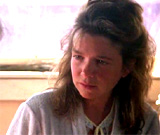
June (Elizabeth Berridge) - Connie's 24 Year-Old Sister
|
- other members of her family included:
- Katherine (Mary Kay Place), her overbearing,
overworked, sarcastic and complaining mother who feared that
her self-centered daughter had only dark and "trashy
daydreams"
- Harry (Levon Helm), her somewhat oblivious, cheerful
and easy-going father who considered her 'daddy's little girl'
- June (a miscast Elizabeth Berridge), her
older more 'perfect' but homely 24 year-old sister, who still
lived at home; June was working to support the family, and looked
down on Connie as a lazy and spoiled brat
- Connie had negative things to say about June,
who was always praised by their parents: "My
parents treat her like Miss Perfect, and I'm some career criminal";
Connie also hated her mother's perceived hatred for her: "God,
why does she think I'm so bad?"
- in one of the film's earliest scenes (her second visit
to the mall), Connie joined her girlfriends: cool Laura Condon (Margaret
Welsh) and inexperienced and naive Jill O'Mara (Sara Inglis), where
they immediately went into the ladies' room to get dolled up by putting
on lipstick and makeup, and changing into more revealing clothing in
order to attract attention (often unwanted)
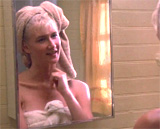
Connie Practicing Talking to Boys In Front of Mirror
|
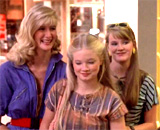
(l to r): Connie, Jill, Laura at the Mall
|
- throughout the hot summer, Connie was alternately
practicing conversations with make-believe boyfriends in front of
her bathroom mirror, painting her toenails, going to the mall or
the movies, sunbathing, making bead necklaces, plotting her next
away-from-home escapade and lying about it, or in her bedroom (with
a James Dean poster) listening to music (significantly James Taylor's
1977 hit-song remake version of 'Handy Man' from 1959, that brought
her to heights of ecstasy)
- she began to spend much of her idle time at Frank's -
a local roadside hot-dog, hamburger and
beer joint next to a busy highway where older guys hung out: ("This
is where it's at"); during her first visit to Frank's (by crossing the
busy and dangerous highway - toward the
'grown-up' world allegorically), wearing a revealing halter-top, she
was closely observed from outside by a mysterious stranger with mirrored
aviator Ray-Ban sunglasses
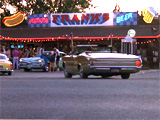
Frank's Hot-Dog/Beer Joint - with a Gold 1966 Pontiac LeMans Convertible Parked
Out Front
|
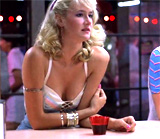
Connie Seductively Dressed Up to Attract Attention Inside Frank's
|
- Connie was picked up at Frank's by two different guys for two quasi-sexual encounters;
the first was with Jeff Toussaint (William Ragsdale) - a decent recent HS grad, who flattered her ego: he called
her the "cutest girl in the whole freshman class"; as
she left Frank's with Jeff, the stranger pointed at Connie and ominously
warned with an unexpected greeting: "I'm watching you" -
as he twirled one extended finger at her; Jeff drove them to a lover's
lane overlook area; after Connie offered an escape wish: "I
wish I could just travel somewhere," she received a single kiss
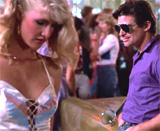
|
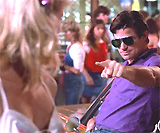
|
|
Stranger (pointing at Connie): "I'm watching you"
|
- on a second occasion, Eddie Hunter (David Berridge),
an aggressive male who was more single-mindedly interested for
sex told Connie: "I wanna get what you got"; he drove them into an empty parking
garage where he touched and kissed her (heavy petting) before she
cautioned him to stop before exiting his car: ("Stop. Look,
I'm not used to feeling this excited"); for the first time,
she suddenly realized the overwhelming and dangerous power of steamy
sex and that she wasn't emotionally ready
- Connie's relationship with her mother also worsened when she threatened
to punish Connie for potentially fooling around and having sex;
their conflict intensified when Connie insultingly mentioned that
her mother had set a poor example by getting pregnant at an early
age: ("You were none too careful yourself, were you? Like you're
some example to try to tell me..") - and her mother slapped
her for insolence
- after her first sexual experiences with boys, and
developing problems with her mother, Connie confided in her older
sister June (who was also worried about Connie getting herself
into trouble) about how much she enjoyed male attentiveness and
desirability: "I never knew it was gonna be so nice. Did you ever
have a boy hold you close and sing to you?
This one boy Eddie - he sang to me right in my ear. And he held me
so sweetly. Ah June, don't you know how that feels? Just to be held
like that?"
- Connie didn't realize that what she had said cruelly
implied that June had never been in love or propositioned; although
June was truly envious of her younger sister's beauty, she hated
her bitchiness: "You're gonna have it all, aren't you? And
you think you deserve it"
- in the film's most effective scenes at her empty
home on a hot Sunday afternoon while her family was away at a BBQ
at her Aunt's place that she refused to attend, Connie was again
daringly intrigued and mesmerized by the arrival of Arnold Friend
(Treat Williams) - the seductive, beguiling and predatory 30-ish
man from Frank's
- he pulled up in his drab 1966 goldish-yellow Pontiac LeMans convertible; he wore
black cowboy boots, jeans and an open-necked short-sleeved light
yellow shirt (posturing and dressed like James Dean)
- the tune on Connie's radio in the house was the same tune loudly blaring
from Arnold's car as he drove up the gravel driveway; he greeted
her: "How ya doing? I ain't late, am I?...I told ya
I'd be out, didn't I?...You're cute"; he was with shy, peculiar
and strange friend Ellie Oscar (Geoff Hoyle), who had his shirt-collar
up and was listening to the tune on a transistor radio next to his ear
- Arnold had previously noticed her at the drive-in (when he told her: "I'm watching
you"), but now formally introduced himself: "I'm Arnold Friend and
that's my real name. And that's what I wanna be to you, a friend";
Arnold spoke about the meaning of the numbers 33-19-17 printed on
the left side of his car. "This here's a secret code. But I'm
gonna let you in on it." [Note: The total of the numbers equaled 69 - a reference to a deviant sexual position.
The numbers also hinted at a Bible verse (Judges 19:17): "When he looked and saw the traveler
in the city square, the old man asked, 'Where are you going? Where did you come from?'"]
- during a 30-minute confrontation,
the antagonistic Friend hypnotically, persuasively, and provocatively
spoke to Connie, continually encouraging her to join him for a ride: "Don't you
wanna go for a ride?...Today's your day set aside to go for a ride
with me, and you know it"; he admitted he was stalking her: "I
know my Connie. I've been watching you. Hey! Me and Ellie come out here especially for you"
- with a very disturbing look, he revealed he intimately knew all about her and her activities:
"I know your name and all about you. I took a real special interest
in you. Such a pretty girl. I found out all about you. Like I know
your parents and your sister are gone somewhere. I know how long
they're gonna be gone. And I know who you were with last night. And
you got one best friend. Her name is Laura..."
- he claimed he knew the names of many of her acquaintances, was about her
age (18), and then mostly flirted with her and seduced her from outside
her thin screen door behind which she had retreated; he refused to
leave ("I'm not leaving till you come with me") when she
kindly asked him a few times to go away; he continued to insist: "And
Connie, no matter who you were with last night, today you're with Arnold
Friend, and don't you forget it....You're special. I saved my whole
Sunday afternoon just for you"
- their encounter was a metaphoric, smooth-talking representation of sexual experience,
the promise of fulfillment, corruption, and sin -- she was intimidated
by him and put under his evil spell when he forcefully and antagonistically
spoke to her and insisted on taking her away to an open field for
sex and love: "You're my date. I'm your lover, Connie...Yes, I'm your lover. You don't know
what that is, but you will. I know that, too. I know all about you.
Hey, it's real nice. And you couldn't ask for nobody better than me
or more polite. I always keep my word. And I'll hold you so nice and
tight, you won't need to think about anything, or pretend anything,
and you won't even wanna get away, even if you're scared. Hell, everybody's
scared the first time. That's why I'm so specially nice. I come along
just when you need a friend. And I'll come inside you where it's all
secret and I'll whisper..."
- she felt he was crazy, but couldn't get him to stop: "Shut
up. You're crazy. People don't talk like that"; he circled back
to his original objective: "I want you, Connie. I want you so
bad....I seen you that night and I said: 'Oh, my God, that's the one.
That is the one. The very special one. I never had to look no more";
he tried to reassure her: "There's nothing to worry about. You're
just a little scared is all"; he asked again: "Be sweet and
pretty like you wanna be and give in to me and get away from here before
your folks come back. You don't want them to get back here before we
do. Now, get up, honey. It's best you get up all by yourself. Come
on, sweetheart"
- and then he delivered a knock-out phrase to convince her that he truly understood her longings
more than her parents, with a promise to assist her in crossing the
threshhold (of the house and of her own life) toward womanhood: "And
they don't know one thing about you and never did. Not a one of 'em would've done this for you"
- she tentatively approached the screen door and then joined him - to depart
from the protection of the house, and her parents, and everything that had shielded her in the past; she corrected
him with a sassy retort: ("What if my eyes were brown?")
when he said: "My sweet little blue-eyed girl"; Arnold's friend Ellie
remained behind with the excuse that he would look after the house during their car ride
- a slow-tracking shot from left to right viewed Arnold's unoccupied car parked in an open
field
- in the ambiguous Rorschach-test ending, the slightly bewildered and disheveled Connie
survived her ride (mostly off-screen) and was returned home; as
Arnold dropped her off at the end of the driveway, he confirmed
that he had kept his basic promise: "I
asked you to go for a ride with me today, and you came. And that's
what happened. Am I right?"; she
left the car, walked slowly to the driver's side of the car, towered
above him, and insisted: "I don't wanna see you here again.
Ever. Understand?"
- Connie was inevitably very dazed and her innocence
was altered by the experience (had she been
raped or sexually-assaulted, or had she engaged in consensual sex,
or had she just gone for a Sunday drive, or was it all in her mind?);
the "trashy daydreams" of her adolescent teen years that
her mother referred to had been shattered
by the awakened Connie who had now come-of-age and realized she could
no longer live in a fantasy world; when her estranged family returned
home, Connie seemed to reconcile with them; her mother apologized
to a reassuring Connie for slapping her earlier
- later that day in her room when asked by her sister what had happened that
afternoon, Connie answered with a confused recollection: "This man
- he came and asked me for a ride. And I went. You know, uh...Maybe
I didn't go. Maybe I'm going out of my mind. Listen, I didn't go.
Don't worry. That didn't even happen"
- the film concluded with Connie and June slow-dancing together to her
favorite song, James Taylor's "Handy Man"
|
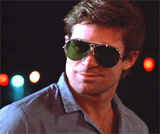
Older Stranger (Arnold Friend) (Treat Williams) - Watching
Connie From Outside Frank's
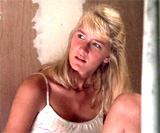
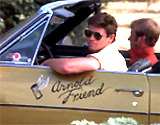
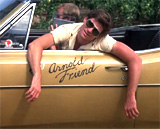
Arnold Friend in His 1966 Gold Pontiac LeMans
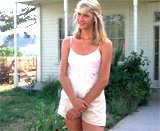
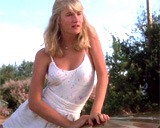
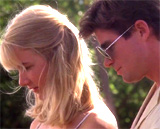
Arnold's Arrival at Connie's House
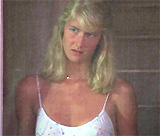
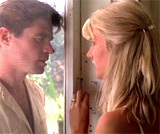
On Two Sides of the Screen Door
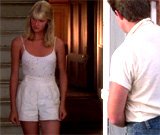
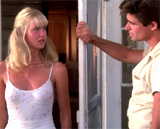
Connie Walking to the Open Screen Door to Accept His Ride
Offer
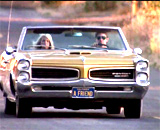
The Car Ride
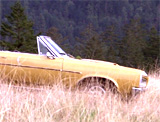
The Parked Car in an Open Field
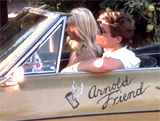
Connie's Drop-Off Back at Her House Driveway

Connie's Final Words to Arnold: "I don't wanna see you here again.
Ever."
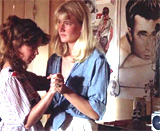
Concluding Scene: Dancing With June
|

















